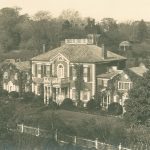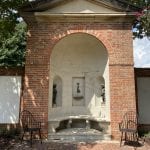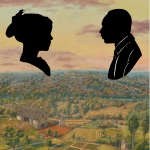Dining with Dolley
In Dumbarton House’s Nourse family letter collection are invitations from President Jefferson, for whom Dolley often served as hostess while James was Secretary of State. Later, President Madison made Charles Nourse the conveyor of dispatches to Great Britain in 1808. One can infer acquaintance, and speculate that Dolley may have bustled out in her carriage to visit the Nourse household, inasmuch as she was an indefatigable social caller.
Later in her life, Dolley remained friends with the Nourse family. Joseph Nourse’s granddaughters Mary (1817-1908) and Caroline (1819-1893) visited Dolley at Montpelier. Dolley and her sister wrote to Caroline Nourse on July 18, 1840,
“I hasten to assure you dear Friend that we shall receive the sweet Caroline with great pleasure at Montepellier, as I should do dear Mary and each individual of my Highland favorites… You enquire on the subject of our visitors – we expect my dear sister and family very soon as also others, who I am sure will not displease our Caroline… Always yours, DP Madison.
Just in time dearest Caroline to add in ten words how happy I shall be to see you but it would take ten hundred to express my thanks for your last beautiful letter which I will answer and more too when you come. Many kisses for my dear Mary and Louisa, the charming poetess – Why dont they come also? I cant tell you who all will be here this summer if Aunt M. [Madison] remains – letters & messages have told us, but I forget all in my hurry. Ever affectionately yours, Anna”
A First Lady Flees to the Sanctuary of Dumbarton House
The War of 1812 is considered by some historians as the second American war for independence. Caused by economic and trade disputes, as well as the impressment of Americans into the British Navy, the war involved British, Spanish, French, and Indigenous peoples.
President James Madison galloped off to Bladensburg, Maryland with his generals, risking death or capture. He is the only U. S. Commander-in-Chief ever to ride to the field of a major battle. As defeat loomed, he was urged to flee the field, and wisely obeyed. Home was hardly safer. In August 1814, British troops advanced upon Washington D.C. On August 24, Dolley Madison was forced to flee the White House. Charles Carroll, the owner of Belle Vue, as Dumbarton House was then named, called on her in his carriage. Dolley recalled the events in a letter to her sister Lucy Payne Washington Todd:
“Our kind friend, Mr. Carroll, has come to hasten my departure, and is in a very bad humour with me because I insist on waiting until the large picture of General Washington is secured, and it requires to be unscrewed from the wall. This process was found too tedious for these perilous moments; I have ordered the frame to be broken, and the canvas taken out. It is done! and the precious portrait placed in the hands of two gentlemen from New York, for safekeeping.
And now, dear sister, I must leave this house, or the retreating army will make me a prisoner in it by filling up the road I am directed to take. When I shall again write to you, or where I shall be tomorrow, I cannot tell!“
– Dolley Madison Papers, Manuscript Division, The Library of Congress

With her sister Anna Payne Cutts’s family, and a carriage-full of official papers, red velvet curtains, and silver, Dolley set off down the only road, Pennsylvania Avenue. Fleeing citizens, many angry with what they called “Madison’s War,” jostled against them. Bridge Street (now M) took the carriage party over Rock Creek into Georgetown. From there, they turned right and climbed the hill. In those days, the Carroll mansion (now Dumbarton House) commanded a broad view of Washington, its forests and surrounding farm land. They could look down on the city they were abandoning to the British: “before they set fire to the Presidents House, many entered it & regaled themselves with Porter wine etc from the cellars!”
Charles Carroll, Dolley’s escort on that fateful day in 1814, was a prominent banker, miller, land investor, and cousin of the Signer of the Declaration of Independence, Charles Carroll of Carrollton. He had bought Joseph Nourse’s Georgetown home in 1813 and renamed it Bellevue, after his former plantation in Hagerstown, Maryland. The Carroll and Madison families were close. Dolley’s son Payne Todd, by her first marriage to John Todd, and the Carroll’s eldest son, Henry, were abroad together. The young men were attached to the Peace Commission at Ghent, an American diplomatic effort to end the war.
Navy Secretary William Jones, a Philadelphian, had been in arms since turning sixteen. He had served in the Revolutionary War and the Continental Navy. As Secretary, he had been overseeing preparations to set fire to the Navy Yard, lest its stores fall into the hands of the enemy. He later wrote:
“I left the Navy yard at about half past three o’clock accompanied by Mr. Duval and not long after learned that our army was rapidly retreating and that of the enemy advancing rapidly. We proceeded to Georgetown where I met my family and that of the Presidents at the house of Charles Carrol [sic] Esq of Belle Vue and received a message from the President requesting that I would join him at Foxalls works. At about 5 oclock I set out in company with the family of the President, of Mr. Carrols [sic] and my own, with Mr. Duval and proceeded through Georgetown to join the President but found he had crossed at Masons ferry.“
– William Jones Papers, The Historical Society of Pennsylvania
British troops marched in by early evening and set fire to the Capitol and the White House. Following the 98-degree heat of the day, a late night thunder and lightening storm erupted – so savage that British and Americans alike were shocked. Torrents of rain put out the fires, but left sodden wrecks in their wake. The White House was in ruins.
The First Lady fled the city, crossing the Potomac at Little Falls Bridge. She spent the night at Rokeby, owned by an old friend, while the President put up at Salona, the Reverend Maffitt’s red brick house in McLean. The second night they were reunited at Wiley’s Tavern in Fairfax County. The President and his men continued scouting, and spent the final night at Brookeville, Maryland. In searching for his wife, and watching for the enemy, 63-year-old James Madison spent almost 4 days in the saddle. For a man who had been too frail to face bullets in the Revolutionary War, this was a triumph of will. He foiled capture and kept the national government functioning. Dolley had safely returned to the Cutts’s Washington House by August 27, where her husband joined her. The presidential couple resumed their former life, moving a month later to the elegant, undamaged Tayloe residence, the Octagon House, one block from the burned out White House.
In July, 2012, with funding from the Humanities Council of Washington, D.C., Dumbarton House produced a video on the War of 1812. The film was directed by Diane Williams.
The Intersecting Lives of Dolley Payne and Anthony Morris
In May of 1816, Joseph Nourse’s son Charles married Rebecca Wistar Morris, daughter of Anthony Morris (1766-1860), a Philadelphia lawyer, merchant, and lifelong friend of Dolley. There are fourteen letters in the Nourse collection written by Dolley to Morris, his wife Mary, daughters Phoebe, and Nourse granddaughters Mary and Caroline.

In 1790, both Dolley Payne and Anthony Morris were married in Philadelphia – the capital of the new country – where everybody knew everybody. Dolley’s parents, Mary and John Payne, were Quakers from Hanover County, Virginia. Anthony Morris was among the eighty-two Quaker witnesses at Dolley’s first marriage, on January 7, 1790 to the eminently suitable John Todd. Four months later, Morris married Mary Smith Pemberton, an equally exemplary Quaker, whom Dolley calls “my beloved friend” in a letter. Sadly, John Todd died in the yellow fever epidemic of 1793 which also claimed their newborn William, leaving Dolley alone with baby Payne. There is a rumor that Anthony Morris introduced James Madison to the widow Dolley Todd. Of course, she would have already known him as a legislator in her home state, author of the Constitution, and sponsor of the Bill of Rights.
James Madison was seventeen years Dolley’s senior and not much taller (a friend measured him at just over 5 feet 6 inches). Rumors of the courtship flew about the city. Within four months, James Madison (43) and Dolley Payne Todd (26) were married. The wedding took place on September 15, 1794 at Harewood, in Charlestown, now West Virginia, the residence of her younger sister Lucy Payne Washington. Anthony Morris was in attendance. Lucy had eloped at fifteen with President George Washington’s seventeen-year-old nephew and namesake. For marrying non-Quaker George Steptoe Washington, Lucy had been “read out” of the Quaker Pine Street Meeting. Dolley would be expelled for the same offense.
The Madisons returned to Montpelier, their extensive estate in Orange County, Virginia, in 1797. They remained friends with the Morrises, who were busy raising four children back in Philadelphia. The Madisons were summoned back to DC in 1801 so James could serve as the Secretary of State. In 1809, he and Dolley moved into the White House as the President and First Lady. Soon, Dolley began looking for a match for her son, Payne (19). Anthony Morris’s eldest daughter, Phoebe (20) was well-educated and devoted to her family and stayed with the Madisons for three months starting in January 1812.
“My ever dear and precious Phebe… I have wept over your charming letter – which proves that I love & regret you. Alas! why did you leave me? Lucy too has gone… Your estimable Parent is but in the prime of life & his appearance, in every respect, corresponds with that age, when perfection of mind, & intelligence interests most… My husband loves & admires you both… I am glad you like my son & I hope he will, by & by, reconcile you to his name.”
Dolley Madison to Phoebe Morris, May 1811
Phoebe wrote long letters home about her time with the Madisons:
“…after arriving here I was so much fatigued for two days that I could scarcely move it seemed as if the Stage was continually driving through my brains… The House was crowded… the Chambers & every room… occupied with Ladies & Gentlemen & all descriptions of persons… I have a dear little room with an alcove Bed which adjoins Mrs. Washington’s [Lucy, now a widow of 35]… Mr Payne says a number of young ladies have fallen in love with Brother [James, 16] – he will stay till after the drawing room. The Vice President [George Clinton] was here this morning. he is a very gallant old Gentleman… The principle belles here are M. de Bonaparte, Miss Caton, Miss Hay… M de Bonaparte [Betsy Patterson of Baltimore]… has unfortunately caught the rhumatism, by going more than half naked…
… Yesterday Mr Foster [the British Minister Sir Augustus John Foster] made a party & took us to Alexandria where we eat Beefstakes & drank Champagne, we dined with teh French Minister [Louis Serurier] at 6 oclock… [he is] his imperial Majesty as they call the minister here for fun – The desert was very elegant indeed the spoons & forks were gold, & the knives with pearl handles & gold blades.
… I was dancing all last night at Mr Fosters, & was this morning so fatigued that my dear Mama, as Mrs Madison always wishes me to consider her, came into my chamber, had my table placed by my bed side & fed me with her own hands-… A number of Persons make their wishes known in the first instance to Mrs Madison, I am very frequently amused with seeing letters to her on those subjects sometimes even written by Ladies for their Husbands, or Brother, or Cousins-…I am left alone to do the honors of the Palace-the Democrats call it the White House…
…The Band then played Madisons March while Mrs M walked up the room, conducted by Mr Hamilton, Secretary of the Navy-Mr Colis conducted Mrs. Hamilton, while Mrs. Washington, the miss Hamiltons & myself followed in train – Mrs M looked unusually Splendid & very beautiful She dressed in white Satin trimmed with silver with a silver headdress something in the form of a crown & a plume of waving feathers… just as Mr Foster was placing Mrs W[ashington] in her seat Madm Bonaparte popped into it; which was very impertinent…”
Since the death of her husband, Lucy Payne Washington had paid long visits to the White House and became close friends with Phoebe Morris. In December 1811, they exchanged a series of gossipy letters now in our collection. In these letters, Lucy teases Phoebe about her Washington beaux and the women exchange news on Martha Washington’s granddaughter’s – the recently divorced Eliza Custis Law – affair with a French military officer. Phoebe chided Lucy for exciting
“all the fears of female fancy by announcing the loss of my Beaux & the arrival of so many dashing Belles at W[ashington]… I will reserve all the thousand questions I have to ask untill I see you…”
In March 1812, Lucy married Judge Thomas Todd (1765-1826), an Associate Justice of the U. S. Supreme Court from Kentucky. Phoebe was a bridesmaid in the very first White House wedding.
When Anthony Morris came to claim Phoebe in April, he wrote home,
“…I dind yesterday & Thursday with the President & have recd a cordial invitation to dine… every day during my continuance here…”
Back in Philadelphia, Phoebe wrote Dolley about a man who called on her father:
“Imagine, my dear Madam, a man of at least fifty, perfectly gray, sufficiently ugly, immensely rich, & terribly fatiguing; & you may have some idea of the Hon. Judge Tucker… [who] jumped up & seizing my hand, told me that if I had no other engagements he should be the happiest of men. (I had never seen him but once in my life)… his belief [being] that I could not resist three hundred thousand dollars…”
The Washington social whirl continued, as Dolley wrote Phoebe the same year,
“A few days ago we had 29 Indians to dinner with us attended by 5 Interpretors & the Heads of Depts making 40 persons… The Band was playing, & dancing succeeded – We sent off our red children however, before we began and had a frolick that would have delighted you… I pray you join us my sweetest – bring Papa, James, Rebecca, and my little Louisa – You shall have choice of partners my darling for Payne will not be here.”
What of Dolley’s hopes that her son would marry Phoebe? Katharine Anthony’s biography describes the frustration of the matchmaker. Payne Todd agreed in April 1820 to visit the Morrises at Bolton. The “feeble suitor” lingered so long en route that he did not reach the farm until July. Anthony Morris instantly notified Dolley of his arrival. Payne and Phoebe, by now 28 and 29, rode into nearby Bristol together, after which Phoebe wrote to Dolley saying her father
“endeavored without success to induce Payne to remain for a longer time among us and Major Nourse wished him to continue for a few days. But all our united attractions failed after two short days, and he proceeded on his journey.”
Phoebe never married. She was more than charming. She spoke Spanish and French and read the classics. She reported shrewdly on the world around her with fewer inhibitions than Dolley. Payne drank, gambled, and disappeared for months on end. In 1830, when Anthony discovered Todd was in debtor’s prison in Philadelphia, he hastily reported so in a letter to Montpelier, not for the first time. Whether Phoebe would have said yes to Payne if he had asked her, and thereby answered a mother’s prayer, that a good girl can straighten out a bad boy, is unknowable. She died in 1825, possibly of tuberculous. Payne continued to make his parents miserable.
Dolley’s other matchmaking endeavors were more successful. She supplied a First Lady for widower President Martin Van Buren, by introducing her cousin Angelica to the President’s son Abraham. Angelica would go on to serve as a hostess for her father-in-law, as Dolley had for President Jefferson.
International Relations
Following the loss of his wife in 1808, Anthony Morris was living in Philadelphia, eagerly awaiting a change. Mrs. Madison wrote Phoebe in July 1812,
“Mr M is anxious to employ your Papa in some good place, entirely within his own gift, when we should not be subject to the political or personal objections of a capricious Senate…”
President Madison made Morris his secret enjoy to Spain to negotiate the purchase of Florida. Bearing special orders signed by Secretary of State James Monroe, Anthony Morris set sail for Spain on July 31, 1813 during the War of 1812. He and son James sailed in a Prussian vessel to Lisbon. The brig Christian Hendrik avoided the conflict, although it was stopped by a privateer, which turned out to be American.
Phoebe, Rebecca, and Louisa Morris were left behind at Miss Jerushia Lyman’s Ladies Seminary in Philadelphia. All three wrote their father frequently. Fearing the British blockade and peril at sea, both Antony and the girls copied their letters, sometimes sending the same news by different ships. Their self=discipline provided the rich inheritance of correspondence that survived in family hands. Here is how Phoebe and Rebecca described the British attack from which Dolley escaped:
“My dear Papa, On the 23rd instant 6 of the Enemy’s frigates moved up the Potomac… The next morning… they had reached Bladensburg… the americans… did not exceed 2000… the enemy… not less than 8 or 9000…the americans were overpowered…retreated & were pursued by the British into Washington which they entered almost without impediment- The Navy yard, the Capitol & the Palace are destroyed! The explosion of the latter was heard at the distance of 16 miles, & the light of the conflagration was visible in Baltimore for many hours…
Some wits have observed that had we as many fortifications as mortifications we might do very well… One company of the British passing near a field… cried out, ‘Oh here are some of the celebrated Water melons….’; perhaps they were very hungry as they ate untill they were quite sick & then wondered how the americans could like such trash…
My dear Papa, This day has been one of the most anxious and I think among the most unhappy of my life – A suspense of 48 hours has been endured by all the inhabitants of Phila relative to the fate of Baltimore upon which ours depend – the stages are all stopt & not even an express arrives. Baltimore is so much more ably fortified than our city that should she fall Phil will not attempt a defence… General Ross [Major General Robert Ross] Admiral Cockrane [Admiral Alexander Cochrane] etc carry desolation wherever they go – During the reign of Napoleon when he conquered almost the whole European World there has never been committed on single act of such wanton & savage tyranny as that exercised by the British…-except in the days of the Goths & Vandals… These ruffians tore down Mrs Madison’s picture & said they would ‘keep Dolley safe & exhibit her in London’… tomorrow I shall be obliged to write the sad account of the Defeat of Baltimore –
Thursday Morning… My dear Papa what a change from despair to joy the British are defeated! General Ross is killed! about noon we heard a loud huzza in the streets & throwing open the windows heard the glad the unexpected shout of Victory ! Victory! Ross is killed! The Enemy are driven back to their Ships!”
In Madrid, Anthony Morris heard of the “Christmas Eve Peace Treaty,” ending the War of 1812, fully a month before the news crossed the Atlantic. He wrote his daughters on January 6, 1815, congratulating them on the “glad tidings, the glorious news of Peace!”
Anthony Morris returned from Spain in 1817. He divided his time between Philadelphia, where he would stay at his son James’s farm, Bolton, and Washington. Here he lived with his daughter Rebecca Morris Nourse, eventually in the house she named the Highlands (today the Sidwell Friends School administration building). In 1819, two years after Morris left Europe, the Adams-Onis Treaty secured Florida from Spain for the United States. From 1822-1827, Anthony Morris worked in the Treasury for Rebecca’s father-in-law, Joseph Nourse, who lived at Mt. Alban (today the site of the Washington National Cathedral).
The End of a Long Friendship
Dolley Madison died on July 12, 1849. The President, Cabinet, Diplomatic Corps, Senators, and Representatives all walked in the cortege, following a state funeral at St. John’s Church, Lafayette Square. Among the mourners was her oldest friend, Anthony Morris. In the Washington years, he had frequently called on her, and they took snuff together. How did Anthony remember Dolley, as he lived on to the comfortable age of 95? In a letter written the year after James Madison died, Anthony gave advice to Dolley’s niece Anna Payne:
“…first, I will apprize you of the high destiny you will be calld to fill at Washington as the adopted Daughter of Mrs. Madison for as such you will be considerd & treated by all who will visit your Aunt… All this numerous class will expect from you, not only all her courtesy of character, all her kindness, her mildness, & her engaging manners, but also, tho yet in miniature, all her virtues & attainments.
Of these, I will only now allude to one, for your imitation, and that is, the peculiar power she always possesd, of making & preserving friends, and, of disarming Enemies… the magic power of your aunt of converting them into friends- this indeed is the moral of her life.”
And how did he picture her, this friend from Quaker days, back when they and the country were young?
“She came upon our comparatively cold hearts in Phila, suddenly & unexpectedly, with all the delightful influences of a summer sun from the sweet south, in the season of May, and at the age of sixteen- bring[ing] with her all the warm feelings & glowing fancies of her native state-
She was the first & fairest representative of Virginia, in the female society of Phila, and she soon raisd the mercury in the thermometors of the Heart to fever heat- …But, I began my letter intending to describe not her early bloom & beauty, but her virtues, for your imitation- …the yet mild majesty of her manner, the stately step, and the sweetly engaging smile…”
Even now, a hundred and fifty years after Dolley’s death, we feel the spell she cast over those who knew her.







